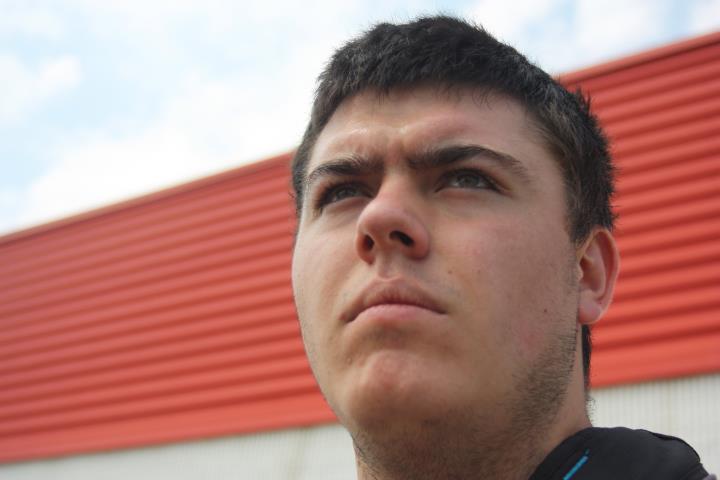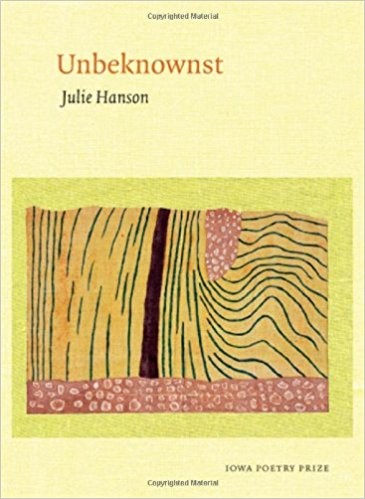ISSN: 1941-4137
POETRY THAT ENACTS THE ARTISTIC AND CREATIVE PURITY OF GLASS
POETRY THAT ENACTS THE ARTISTIC AND CREATIVE PURITY OF GLASS

Stephen Furlong is a recent graduate with an M.A. in English from Southeast Missouri State University. His poems, reviews, and interviews have appeared in Glass: A Journal of Poetry, Pine Hills Review, Yes Poetry, and FIVE:2:ONE, among others. He also had a poem in A Shadow Map: An Anthology by Survivors of Sexual Assault which was edited by Joanna C. Valente and published by Civil Coping Mechanisms. He can be reached at @StephenJFurlong on Twitter.
Previously in Glass: A Journal of Poetry:
Nostalgia
March 15, 2018
Edited by Stephanie Kaylor
#TBT Reviews Series
Edited by Stephanie Kaylor
#TBT Reviews Series
Review of Unbeknownst by Julie Hanson
 Unbeknownst
by Julie Hanson
University of Iowa Press, 2011
Jimmy Santiago Baca wrote in Working in the Dark: Reflections of a Poet from the Barrio "…if we lose poetry we lose what makes us human" (Red Crane Books, 1992). Frankly, I don't want to imagine a world I live in without poetry because I believe poetry makes me, and my life, better. I admit, I came to Julie Hanson's poetry by happenstance and fascination with her book's title. Unbeknownst (University of Iowa Press, 2011). Its definition hints at happening without someone knowing or, the definition I like, without being seen. Hanson's poetry reminds me of the art of puppetry, the need for exact placement of hands, the figure dancing on its tiny stage, and shadows — always shadows. Hanson, seemingly without fear, weaves narrative and herstories in such a profound and simplistic way that I was drawn to. I found her poetry like that of a sojourner, an individual that bounces around from place to place, sharing bits of wisdom and advice along the way.
The book opens in a Robert Creeley "I Know a Man" sort of way as Hanson tries to articulate the love of a book, but the title hints at more: "Use the Book". By the poem's end, instead of a vehicle distracting one's sight like the Creeley poem, there's a muskrat dashing through the second half of the poem until the speaker, perhaps resignedly, says "…Well, at least/hit him on the head with something. Take this." The first time I read this poem, I laughed, but upon a follow-up read I found myself struck by the poem's immediacy and the capture of life's as-it-were moment. That power is not one I take lightly; in fact, I'd say it's a rather strong poetic skill to possess. The poem, in this case, rivals a flip book, each little picture moving by the power of hands to create a new result. That's something Hanson is able to do — provide her images movement and, as a result, revelation.
Showcasing her desire for movement and growth, early on in the collection is her poem "Flow". Alluding to Hanson's "likes" (a word that's repeated throughout the poem) when it comes to yoga, almost suddenly the poem takes on a life-view that moves image towards understanding. Hanson writes:
I like the balancing poses like tree and eagle and warrior three
and being reminded of where we fold in half,
the symmetry of every action taken
being taken once again on the other side.
I admit, I am not a yogi, but I am drawn to these lines because through the image Hanson conveys there are learned lessons and it strikes me as such a moving capture. The power in these lines, within the symmetry of every action taken, reveals strength and grace as contorting one's body to the alluded to yoga poses.
In addition to poems regarding her passion for yoga, Julie Hanson also writes of her family and the life they live together. Her keen vision of familial interactions are illustrated by poems like "His Dream" and "Balance," which reveal both tenderness and hints of tension and discomfort. Because of the straightforward language of Hanson's poems, it feels as if we as readers are within these events, as a flower in the corner of decorative wallpaper. To allow that closeness, Hanson's writing showcases her skill of writing human nature. And what a skill it is.
Visit University of Iowa Press' Website
Unbeknownst
by Julie Hanson
University of Iowa Press, 2011
Jimmy Santiago Baca wrote in Working in the Dark: Reflections of a Poet from the Barrio "…if we lose poetry we lose what makes us human" (Red Crane Books, 1992). Frankly, I don't want to imagine a world I live in without poetry because I believe poetry makes me, and my life, better. I admit, I came to Julie Hanson's poetry by happenstance and fascination with her book's title. Unbeknownst (University of Iowa Press, 2011). Its definition hints at happening without someone knowing or, the definition I like, without being seen. Hanson's poetry reminds me of the art of puppetry, the need for exact placement of hands, the figure dancing on its tiny stage, and shadows — always shadows. Hanson, seemingly without fear, weaves narrative and herstories in such a profound and simplistic way that I was drawn to. I found her poetry like that of a sojourner, an individual that bounces around from place to place, sharing bits of wisdom and advice along the way.
The book opens in a Robert Creeley "I Know a Man" sort of way as Hanson tries to articulate the love of a book, but the title hints at more: "Use the Book". By the poem's end, instead of a vehicle distracting one's sight like the Creeley poem, there's a muskrat dashing through the second half of the poem until the speaker, perhaps resignedly, says "…Well, at least/hit him on the head with something. Take this." The first time I read this poem, I laughed, but upon a follow-up read I found myself struck by the poem's immediacy and the capture of life's as-it-were moment. That power is not one I take lightly; in fact, I'd say it's a rather strong poetic skill to possess. The poem, in this case, rivals a flip book, each little picture moving by the power of hands to create a new result. That's something Hanson is able to do — provide her images movement and, as a result, revelation.
Showcasing her desire for movement and growth, early on in the collection is her poem "Flow". Alluding to Hanson's "likes" (a word that's repeated throughout the poem) when it comes to yoga, almost suddenly the poem takes on a life-view that moves image towards understanding. Hanson writes:
I like the balancing poses like tree and eagle and warrior three
and being reminded of where we fold in half,
the symmetry of every action taken
being taken once again on the other side.
I admit, I am not a yogi, but I am drawn to these lines because through the image Hanson conveys there are learned lessons and it strikes me as such a moving capture. The power in these lines, within the symmetry of every action taken, reveals strength and grace as contorting one's body to the alluded to yoga poses.
In addition to poems regarding her passion for yoga, Julie Hanson also writes of her family and the life they live together. Her keen vision of familial interactions are illustrated by poems like "His Dream" and "Balance," which reveal both tenderness and hints of tension and discomfort. Because of the straightforward language of Hanson's poems, it feels as if we as readers are within these events, as a flower in the corner of decorative wallpaper. To allow that closeness, Hanson's writing showcases her skill of writing human nature. And what a skill it is.
Visit University of Iowa Press' Website
Glass: A Journal of Poetry is published monthly by Glass Poetry Press.
All contents © the author.
All contents © the author.





